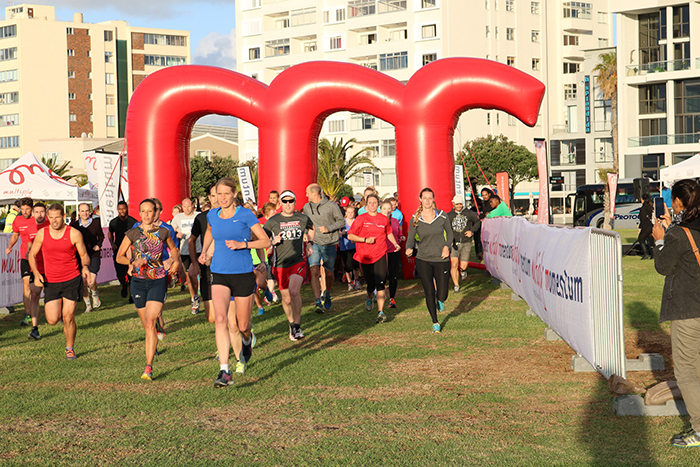First African-hosted International Society for Behavioral Nutrition and Physical Activity Annual Meeting challenges body and mind

Conferences are a prominent feature of academic life as they present opportunities to engage with new research and build collaborations. The recently concluded Annual Meeting of the International Society of Behavioral Nutrition and Physical Activity (ISBNPA), hosted by the UCT Division of Exercise Science and Sports Medicine, did things a little differently with a program that challenged both the minds and bodies of its delegates.

Photo: ISBPNA run delegates take off in the Multiply 5Km charity run at Seapoint promenade.
The Annual Meeting of the International Society of Behavioral Nutrition and Physical Activity (ISBNPA) aims to showcase the best global research and evidence-based practice in the areas of behavioural nutrition and physical activity, and to provide networking opportunities for researchers and practitioners working in this field.
Along with the customary academic programme invigorating activities were held in the downtime. A scenic run at the Sea Point promenade and an interactive drumming session were amongst the highlights of the conference.
The local organising committee, headed by Dr Catherine Draper, a senior research officer in the Division pulled all the stops to host a meeting of international standards. This was the first time the conference was held in a low- and middle-income country, and no opportunity to showcase African research was wasted.
Delegates from South Africa, Kenya, Uganda Mozambique and Nigeria were in attendance and two symposiums highlighting research from the continent were held.
Representatives from the Divisions of Exercise Science and Sports Medicine and Human Nutrition presented their work demonstrating the excellence of research in these fields. The Division of Exercise Science and Sports Medicine is at the forefront of local research on physical activity behaviour, and the Division of Human Nutrition has a good track record in the field of public health nutrition.
Dr Draper is pleased with the outcome of the conference: “It was a valuable opportunity to expose international delegates from the field of physical activity and nutrition behaviour to South Africa, and to gain some insight into the South African context as far as these behaviours are concerned. It was also valuable to expose South African researchers and students to the best research in the field, and to provide an international platform for them to present their work.”
Professor Estelle Lambert of the Division of Exercise Science and Sports Medicine echoes these sentiments saying the conference had a positive and possibly immeasurable benefit to the research enterprise at the University of Cape Town, and highlighted local capacity, while offering opportunities for partnering.